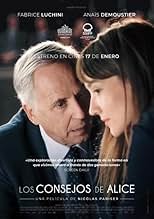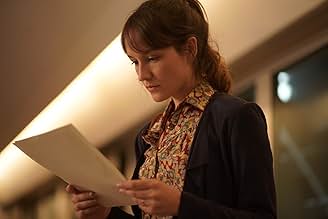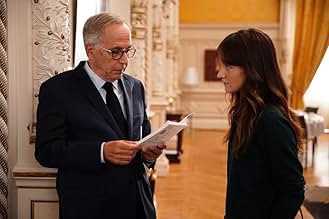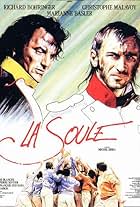The mayor of Lyon is in existential crisis. After 30 years in politics, he feels totally empty and devoid of ideas. As a fix for this problem, his aides bring a brilliant young philosopher, ... Read allThe mayor of Lyon is in existential crisis. After 30 years in politics, he feels totally empty and devoid of ideas. As a fix for this problem, his aides bring a brilliant young philosopher, into his inner circle.The mayor of Lyon is in existential crisis. After 30 years in politics, he feels totally empty and devoid of ideas. As a fix for this problem, his aides bring a brilliant young philosopher, into his inner circle.
- Awards
- 2 wins & 8 nominations total
- Director
- Writer
- All cast & crew
- Production, box office & more at IMDbPro
Featured reviews
Right from the beginning, we easily recognize the agitated, mischievous and disenchanted atmosphere of The French Minister (2013) (a lot) and The Minister (2011) (a little) with an obvious inspiration from the universe of Éric Rohmer.
Paul Théraneau (Fabrice Luchini) is the current mayor of Lyon and in the midst of an existential crisis. He compares himself to a Formula One with an overpowered engine but out of fuel, continuing to move thanks to inertia more than anything else. He fears that his electorate notices it. He recruits in this way Alice Heimann (Anaïs Demoustier), a woman as brilliant as young and whose career is limited to professorship within the prestigious University of Oxford. She is obviously smart but her political and professional inexperience will quickly contrast with the lions' den atmosphere that reigns in the town hall of Lyon and the French Socialist Party.
Beyond the complicity that is very quickly developed between Paul and Alice, the film skillfully mixes politics (Fabrice Luchini), philosophy (Anaïs Demoustier), communication (Antoine Reinartz), tradition (Pascal Rénéric), art (Maud Wyler), friendship (Alexandre Steiger), uselessness (Nora Hamzawi), ... Despite some slight snags, the result is fundamentally successful. I really appreciated the obvious quality of the dialogues and these excellent acting games around Fabrice Luchini.
As a synthesis: 7/8 of 10
Paul Théraneau (Fabrice Luchini) is the current mayor of Lyon and in the midst of an existential crisis. He compares himself to a Formula One with an overpowered engine but out of fuel, continuing to move thanks to inertia more than anything else. He fears that his electorate notices it. He recruits in this way Alice Heimann (Anaïs Demoustier), a woman as brilliant as young and whose career is limited to professorship within the prestigious University of Oxford. She is obviously smart but her political and professional inexperience will quickly contrast with the lions' den atmosphere that reigns in the town hall of Lyon and the French Socialist Party.
Beyond the complicity that is very quickly developed between Paul and Alice, the film skillfully mixes politics (Fabrice Luchini), philosophy (Anaïs Demoustier), communication (Antoine Reinartz), tradition (Pascal Rénéric), art (Maud Wyler), friendship (Alexandre Steiger), uselessness (Nora Hamzawi), ... Despite some slight snags, the result is fundamentally successful. I really appreciated the obvious quality of the dialogues and these excellent acting games around Fabrice Luchini.
As a synthesis: 7/8 of 10
Excellent actors, interesting-ish topic (local politics in a French city). At times I felt I was watching a documentary, some other times I felt I was there myself. The characters are very realistic in their frenchness and overall i found it an enjoyable watch. I do agree with some of the critics I have seen here and there regarding the dialogs: superficially they're good but if you engage too much in what is being discussed, it becomes apparent that it's not exactly at the level you'd expect from so-called intellectuals. In a way, it doesn't matter as it's more a comedy than an art house film but the main characters keep coming back to the subject of having ideas and the role of the « intellectual » in the society, making the above hard not to notice.
The movie genre showing political backstages is firmly established, but what does happen if the boss is Fabrice Luchini and an improbable but brilliant philosopher joins the party?
Well, you'll get a thoughtful comedy with punching, suggestive dialogues and a warm look on an ending left-wing political career. And extremely vague answers.
Alliance Française French Film Festival Alice is a philosopher who is invited to work for the Mayor of Lyon. Paul, the Mayor has reached the time in his life where he is suffering from a lack of new ideas, both political and of any other kind. Alice, unknowingly to herself is also having a crisis of self belief. Can these two very different people complete each other? What are the defining characteristics of a real friendship?
ALICE AND THE MAYOR is a slice of life gentle sort of film that touches lightly upon serious problems. There are no higher stakes and dramatic turns. But it's a timely reminder that those are often not needed to have a turmoil in one's soul.
The main focus of the film is in dialogue. It is swift, precise, somewhat intellectual but never snobbish. There are many characters, some are memorable even though they fleetingly enter and leave the scene. Fabrice Luchini, as the mayor, is warm, with not being overly friendly, and stern in a way that comes out as gentle. It's a complex character with only the tip of the iceberg being shown, but somehow we can feel the rest of it hidden away. A wonderful performance indeed.
This is not a film for everyone. It's very smooth and devoid of any sharp angles. If politics is a cutthroat business this is not how it's presented here. For most of the viewers the characters will seem to come from a parallel world. Even being very likeable, they are extremely detached from reality and this is the movie's weakest point.
ALICE AND THE MAYOR is a slice of life gentle sort of film that touches lightly upon serious problems. There are no higher stakes and dramatic turns. But it's a timely reminder that those are often not needed to have a turmoil in one's soul.
The main focus of the film is in dialogue. It is swift, precise, somewhat intellectual but never snobbish. There are many characters, some are memorable even though they fleetingly enter and leave the scene. Fabrice Luchini, as the mayor, is warm, with not being overly friendly, and stern in a way that comes out as gentle. It's a complex character with only the tip of the iceberg being shown, but somehow we can feel the rest of it hidden away. A wonderful performance indeed.
This is not a film for everyone. It's very smooth and devoid of any sharp angles. If politics is a cutthroat business this is not how it's presented here. For most of the viewers the characters will seem to come from a parallel world. Even being very likeable, they are extremely detached from reality and this is the movie's weakest point.
Politicians and the bureaucracy around them (political parties, parliaments, governments, mayors) do not enjoy a good rating nowadays. However, films about politicians and those around them seem to be more successful than the politicians themselves. A good example in this regard is 'Alice et le maire' ('Alice and the Mayor') a film that comes from France, a country that seems to be in recent years in a permanent state of dissatisfaction with the existing economic and social order, with its political institutions and with members of the political class. The film, whose action takes place a few years ago at the City Hall of Lyon and in the milieu of the municipal and political bureaucracy of the Socialist Party, enjoyed an unexpected success without even resorting to sensationalist issues such as crime, sex, or corruption scandals. Perhaps precisely through the relaxed and slightly humorous approach, the script written by Nicolas Pariser (who is also the director of the film) reaches more effectively aspects of deeper, systemic corruption of the French political machinery.
However, the premises of the story do not seem too credible. I am not very familiar with the French political system, but I believe that even in France there are no positions for philosophers advisers to the mayors, paid on public money, nor that politicians with decades of political activity and presidential ambitions publicly declare that they are short of ideas. Probably, then, only in the films Alice (Anaïs Demoustier), a fresh graduate from Oxford, could she employed at the City Hall in Lyon just to provide ideas to Mayor Paul Theraneau (Fabrice Luchini) and that could become in a few days or weeks involved at top level in the affairs of the city and of the Socialist Party. The activity of the party on the public money of the town hall also seems little plausible. Probably the whole situation should be viewed more as a cinematic convention rather than real events in the immediate actuality. But even so, the dialogues between the mayor and the young philosopher represent the guiding thread and the most successful and probably the most important part of the movie from the point of view of the filmmakers.
The discussions between the two protagonists work very well thanks to the charm and the talent of the two actors. The mayor's role is written for Fabrice Luchini who lends to the character his noble style, intellectual charisma and impeccable French language, serving us even with a reading from a book, one of those that made him famous in France. Anaïs Demoustier copes well with the scenes that she shares with Luchini, but also with those that describe her personal dilemmas and the confrontation with the municipal bureaucracy. Secondary roles create believable portrait sketches of Alice's friends and of the politicians and bureaucrats in the town hall hierarchy. The story, however, stumbles badly towards the end, when the politician's decision or indecision at critical moments is difficult to understand, perhaps due to the use of details related to party politics. French viewers might be better off deciphering such details as well as some of the literary and cultural references appearing in discussions, but cinematically the story does not hold water. The approach of 'Alice and the Mayor' is comical and empathetic towards the heroes, the ending is open, so what we get is pleasant entertainment around a political topic. Of course, there will be other films that will address the troubled French political actuality with different approaches and from many other points of view.
However, the premises of the story do not seem too credible. I am not very familiar with the French political system, but I believe that even in France there are no positions for philosophers advisers to the mayors, paid on public money, nor that politicians with decades of political activity and presidential ambitions publicly declare that they are short of ideas. Probably, then, only in the films Alice (Anaïs Demoustier), a fresh graduate from Oxford, could she employed at the City Hall in Lyon just to provide ideas to Mayor Paul Theraneau (Fabrice Luchini) and that could become in a few days or weeks involved at top level in the affairs of the city and of the Socialist Party. The activity of the party on the public money of the town hall also seems little plausible. Probably the whole situation should be viewed more as a cinematic convention rather than real events in the immediate actuality. But even so, the dialogues between the mayor and the young philosopher represent the guiding thread and the most successful and probably the most important part of the movie from the point of view of the filmmakers.
The discussions between the two protagonists work very well thanks to the charm and the talent of the two actors. The mayor's role is written for Fabrice Luchini who lends to the character his noble style, intellectual charisma and impeccable French language, serving us even with a reading from a book, one of those that made him famous in France. Anaïs Demoustier copes well with the scenes that she shares with Luchini, but also with those that describe her personal dilemmas and the confrontation with the municipal bureaucracy. Secondary roles create believable portrait sketches of Alice's friends and of the politicians and bureaucrats in the town hall hierarchy. The story, however, stumbles badly towards the end, when the politician's decision or indecision at critical moments is difficult to understand, perhaps due to the use of details related to party politics. French viewers might be better off deciphering such details as well as some of the literary and cultural references appearing in discussions, but cinematically the story does not hold water. The approach of 'Alice and the Mayor' is comical and empathetic towards the heroes, the ending is open, so what we get is pleasant entertainment around a political topic. Of course, there will be other films that will address the troubled French political actuality with different approaches and from many other points of view.
Storyline
Did you know
- TriviaFrench visa #147111.
- GoofsWhen the motorcade leaves for the plaque inauguration, it looks like they're going north along the Rhône from the city hall, then they're going south along the Rhône (the Incity building is visible on the left) and they end up on the slopes of Croix-Rousse, which is north of city hall.
- ConnectionsReferenced in Room 999 (2023)
- How long is Alice and the Mayor?Powered by Alexa
Details
- Release date
- Countries of origin
- Language
- Also known as
- Alice ve Belediye Başkanı
- Filming locations
- Lyon, Rhône, France(main location)
- Production companies
- See more company credits at IMDbPro
Box office
- Gross worldwide
- $6,163,499
- Runtime1 hour 43 minutes
- Color
- Aspect ratio
- 1.85 : 1
Contribute to this page
Suggest an edit or add missing content


![Watch Trailer [English SUB]](https://m.media-amazon.com/images/M/MV5BOTg2NTJjOWEtNDEwNy00MGJjLWE4MjQtOWQxY2U2Zjc0OGI1XkEyXkFqcGdeQXRyYW5zY29kZS13b3JrZmxvdw@@._V1_QL75_UX500_CR0,0,500,281_.jpg)
![Bande-annonce [OV]](https://m.media-amazon.com/images/M/MV5BMTM2MDIzNjItY2YxNy00Nzc1LTkxZDctMjIyYjUyNjc1MDY0XkEyXkFqcGdeQXRyYW5zY29kZS13b3JrZmxvdw@@._V1_QL75_UX500_CR0,0,500,281_.jpg)


























